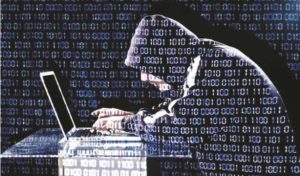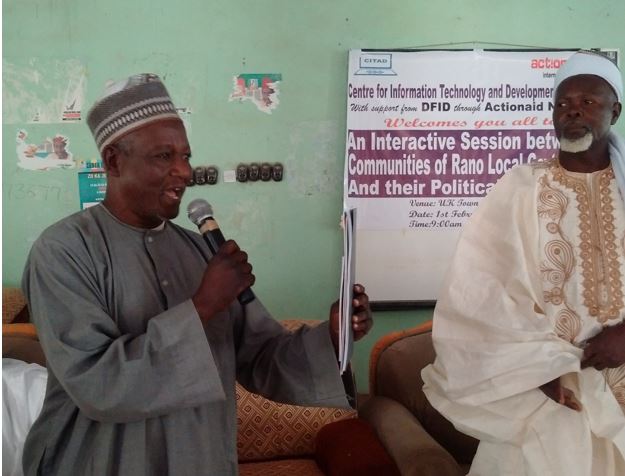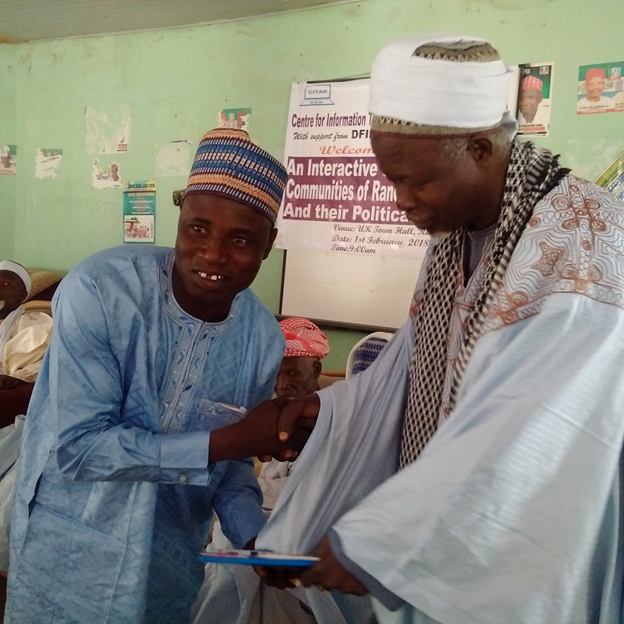By Maryam Ado Haruna.
Distinguished members of the press, I welcome you all to our press conference on the outcomes of our researches on Gender Based Violence Online.
In 2017, Center for Information Technology and Development (CITAD), with support from Internews and Association for Progressive Communication, undertook some researches to find out factors inhibiting women’s participation online especially in the northern Nigeria. The findings of the study have proven that one of the most pressing factors that discourage internet use by women was the fear of the internet. In particular, there were references to sexual harassment and other negative experiences that women are subjected to online.
The main objectives of the researches are:
• To examine the level of women’s awareness on the term GBVO.
• To identify instances of GBVO in northern Nigeria.
• To find out the impact of GBVO women’s participation online.
• To identify the most commonly used platforms for GBVO.
• To find out whether women in northern Nigeria are conversant with internet safety and security tools.
Let me make a clarification here. Sometimes, people confuse gender based violence online with cybercrime. GBVO is an act of cybercrime carried out against a woman because she is a woman; this is primarily carried out to injure her feelings, damage her reputation or tarnish her image. In Nigeria and particularly northern Nigeria, much honour and dignity is being attached to a woman in such a way that an injury to her image affects her greatly if compared with how it affects a man. A typical example is in the case of Rahama Sadau, where people accused her of immorality and irresponsibleness, leaving the man they featured together in the video behind.
GBVO acts include any of the following:
• Unwanted/unsolicited messages;
• Exposure to indecent materials;
• Explicit solicitation from other people (e.g of a picture);
• Posting of pornographic materials;
• Disclosure of our private life by someone online;
• Unauthorized exposure of one’s compromised or naked pictures by someone including boyfriend, husband, ex-boy or ex-husband;
• Threat of exposure by someone;
• Physical attack arising from online contact or conversation;
• Lack of privacy;
• Exposure to the public;
• identity theft;
• Identity impersonation.
• Account hacking etc.
The major findings include of our researches include:
• 41.4% respondents said they have experienced such harassments, 48.9% others said they have never experienced such, 9.7% more said they are not sure whether they have personally experienced online harassment or not. 80.5% of the respondents also said they know women that have experienced GBVO
• A lot of women from our FGD explained that they have experienced account hacking (mostly email and Facebook account) and identity theft, image destruction through photoshop, sexting and spreading of false information with their photos.
• 75% believed GBVO discourages internet, 15% disagreed while 10% were not sure. Most respondents in our FGD believed that it discouragers Internet use by women.
• Among the impact GBVO has made on the respondents, 36% dislike using the internet, 43% use the internet with fear, while 21% went offline completely. Some respondents in the FGD said that their parents/husband stopped them from using the internet, some others said the stopped using the internet themselves.
• 54.1% respondents believed that their harassers were males, 26.4% said they were females, while 19.5% were not sure of their harassers’ gender. The respondents in the FGD reported that most perpetrators were males, though they gave some instance of female perpetrators too.
• 49.5% were harassed online because they were females, 21.5% respondents did not agree that they were harassed because they were females, while 29.1% (27) others said they were not sure.
• Facebook (70%) is the most common platform for GBVO, the others include: WhatsApp (16%), Instagram (8%), Twitter (5%) and Viber (1%). The findings were similar with that gotten from the FGD.
We also undertook a pre and post radio programme surveys to examine the understanding of women on the term GBVO and internet safety and security tools. The data was used to feed our campaign over the radio and also to evaluate the success of the campaign.
The major findings of the pre radio survey were:
• Findings have shown that the 89% of respondents believe that the internet is important to them.
• They use the internet either for educational purposes, researches, communication or for information, though some have mentioned that pornographic materials and harassment make the internet less important to them.
• Results have also shown that most of the respondents (more than 80%) do not know the meaning of internet safety and security, nor do they know the privacy protection tools in which they can use to protect themselves from GBVO.
• The respondents also expressed that they have confidence in the use of the internet and are also confidential that the privacy protection tools can protect them from GBVO.
The post programme survey had shown increase in the understanding of GBVO with significant difference.. The results have also shown that the women in Kano state have become more aware of the importance of the internet to them and to the society at large. They have also become more confident in the use of both the internet and the online protection tools. Findings have also revealed that most respondents fear for the internet has been reduced with a significance percentage.
CITAD’s Campaign
From the data that was generated, it is clear that gender-based violence online is one of the cross-cutting issues affecting women’s participation on the internet. The results of the studies have shown that women in northern Nigeria are being subjected to various forms of online violence such as harassments, intimidations and threats, which tend to discourage the use of the internet by the women. This has especially holdback women’s participation online in the northern Nigeria where the culture, tradition, attitude and religion (to some extent) in their originality affect their internet use. Thus we embarked on a campaign with support from Internews and APC.
Our campaign therefore involved an interactive radio programme on Freedom Radio 99.5FM which centers on the following:
We tried to make the public to realize the importance of the internet to women and for them to accept it as a right that women should have access to the internet. Secondly, we tried to enhanced the capacity of people especially women on how to use the internet safely. In addition, we held a stakeholders’ meeting which brought government, civil society activists, women and religious leaders to deliberate on the research outcomes on Gender Based Violence Online undertaken by CITAD. Finally, we tried to raise awareness about internet as a right and factors that hinder the effective use of the internet by women.
In our campaign over the radio and other mediums, we advised women of decency and moral conduct online in order not to directly invite GBVO themselves. But we are advocating for a safe internet which women can use freely without any fear. Of course, GBVO is an infringement to the rights of women since it has made a lot of women to stop using the internet or has posed fear in their mind while they use the internet.
CITAD also organized a two day training of trainers on addressing GBVO for 20 women from various states. We taught them the tools they can use to protect themselves online. We are expecting them to step down the training to at least 20 other women in their communities/organisations. We also organized a validation meeting on the researches we have conducted.
Call for Action
1. CITAD is calling on the government to introduce internet safety and security in the curriculum of Computer Studies at secondary schools
2. Introduction of protection of privacy and personal data protection law in the country
3. Ensuring the effective implementation of the “Do Not Disturb†policy of the Nigerian Communications Commission which requires service providers to stop the sending of unsolicited messages by third parties.
Role for All
Addressing GBVO is a collective responsibility (including governments, cooperate bodies and individuals). Specifically we need:
1. For Women:
• Before going online, women must ensure they are well-prepared to understand and mitigate the risks they might face in the course of accessing the internet. Such preparation might include knowing and understanding the privacy and personal security online that they can use to protect themselves from harassers online.
• Reading “Terms and Conditions†before agreeing to use or register with any type of application of platform is very essential in protecting oneself.
• Women should keep their personal information private on the internet especially on social media. Such information like mobile phone number should be kept hidden on platforms like Facebook where everyone could possibly have access to it.
• Displaying improper pictures of videos of oneself can easily attract harassers to a woman.
2. For Law Makers:
• Laws punishing online harassers should be reinforced (The 2014 Cybercrime Act is not enough).
• The acts (GBVO) should be clearly stated as unacceptable and punishable by law.
• Police can follow up the complaints made by victims through the links provided by the service providers and make a thorough investigation. Harassers should then be punished accordingly.
• Thus, police and service providers should work together in identifying and prosecuting perpetrators of online gender based violence.
3. For Internet Service Providers (ISPs):
• Service providers should allow users to submit complaints about a particular website or platforms either through a telephone hotline or an online form.
• Actions should be taken instantly on any reported online violence so as to limit online gender based violence.
4. For NGOs and CBOs
• NGOs/CBOs should engage themselves in campaigning against GBVO. They should also formulate training for women on how they could safely use the internet by educating them on online privacy and protection tools.
• Enlighten those who perpetrate GBVO or who are likely to do so on the consequence of their actions
• Remove the psychological reasons which tempt to make people harass women online by campaigning to alter attitudes in society so that the views (GBVO) are seen as unacceptable.
5. For Journalists/Media Organisations
• Awareness creation to make people understand GBVO through daily and other programmes.
• Setting an agenda for the society on GBVO until it is recognized as harmful and therefore provoke action to address it.
















